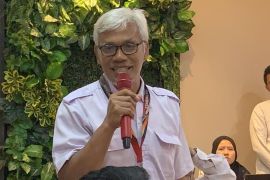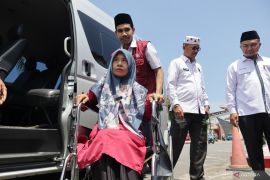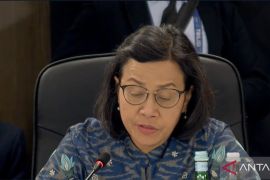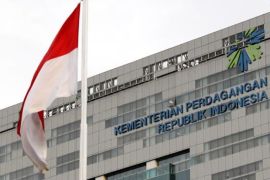"That does make sense to me. It is a mere NGO. How can an NGO be my counterpart? Think of it," Luhut said.Jakarta (ANTARA News) - Coordinating Minister for Political, Security and Legal Affairs Luhut Pandjaitan stated here on Thursday that the recent decision of the International Peoples Tribunal (IPT) is illogical.
IPT has said the Indonesian government must be held responsible for the human rights violations that have happened in the country in 1965.
Luhut said IPT is a mere non-governmental organization and so it is not appropriate to equalize it with the government.
"That does make sense to me. It is a mere NGO. How can an NGO be my counterpart? Think of it," he said while commenting on the issue at his office.
The minister also doubted the truth of the information contained in IPTs decision that Indonesia had committed crimes against humanity in 1965-1966, including the killing of 400,000 to 500,000 members, alleged members of the then Indonesian Communist Party (PKI) and supporters of President Soekarno and members of the radial Indonesia Nationalist Party (PNI) and their families.
He said the figures were not tabulated, based upon accurate data, but from a mere report filed by a fact-finding team led by then retired Major General Sumarno before President Soekarno.
Luhut pointed out that he knew it from retired Lieutenant General Sintong Pandjaitan, who was in charge of leading the armys special force Kopassus (RPKAD) in Pati, Central Java, in 1965.
"Sumarno mentioned 75,000, but then Bung Karno (President Soekarno) argued how could the number be that small? No, it is wrong. It has to be four times that. So, it comes to 400,000. Thats what he (Sumarno) said then. Of course we understand that the situation then is not as transparent as it is now," Luhut said.
He said the Indonesian government would not consider IPTs decision because it was made based merely on assumptions.
The IPT would have to submit its decision to the Indonesian government following the end of the session in The Hague, Netherlands, on November 10 to 13, 2015, which was led by Chief Judge Zak Yacoob.
In a written statement received here on Wednesday (July 20), the coordinator of IPT 1965, Nursyahbani Katjasungkana, said the IPTs decision would be submitted to President Joko Widodo during a meeting with the victims of human rights violations that the President has promised through his spokesman, Johan Budi.
"The decision will also officially be submitted to the Attorney General, the Justice Minister, the Coordinating Minister for Political, Security and Legal Affairs and the Presidents staff office," she said.
The decision covers crimes against humanity committed by Indonesia that include the killing of 400,000 to 500,000 people, who violate Article 139 and 140 of the Indonesian Criminal Code and Law Number 26 of 2000 in the Human Rights Court.
It also covers jailing without due process of law of around 600,000 people and slavery involving prisoners being forced to work under conditions that could be categorized as a crime against humanity and also the violation of the Convention on Forced Work of 1930.
The fourth includes large-scale torture of prisoners during the mass killings and imprisonment. The fifth is a large-scale forced elimination with many of its victims being unaccounted for.
The sixth includes systemic sexual violence that has been recorded in the report of the National Commission on Women, verbally or in a written form, while the seventh is the alienation of citizens through passport confiscation, while they traveled abroad to make them to lose their citizenship.
The eighth is about false propaganda in the official version on people caught in Lubang Buaya while the ninth is about the involvement of other countries, such as the United States, Britain and Australia in the crimes against humanity that took place after the September 30, 1965 incident, although the degrees of their involvement vary.
The last point is Indonesia being accused of committing genocide aimed at destroying or eliminating the group partly or entirely while Indonesia is bound by provisions in the Convention of Genocide of 1948 under the international law.
"The IPT activists would use any avenue available in the United Nations Human Rights mechanism to popularize this decision, including on April 17, 2017 the revision of human rights implementation in the Universal Periodic Review in the Human Rights Council in Geneva, Switzerland. We would submit the IPT 1965s decision as a report from NGO in Indonesia," Nursyahbani said.(*)
Editor: Heru Purwanto
Copyright © ANTARA 2016











